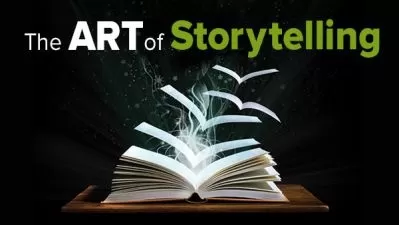The Power of Storytelling with Ari Shapiro
Ari Shapiro
6:21:56
Description
Stories are one of the most fundamental aspects of the human experience. They seize our attention, help us make meaning, allow us to better understand ourselves (and others), and offer new perspectives on the world. But how do you make a story do all that?
As a New York Times best-selling author and award-winning host of NPR’s All Things Considered, Ari Shapiro knows the power of storytelling better than most. He’s covered wars in Iraq, Ukraine, and Israel. He’s sat down with celebrated authors and struggling families. He’s reported from migrant caravans on the ground and press pools aboard Air Force One. And the longer he’s worked in the field, the more convinced he’s become of storytelling’s primal importance.
“Stories are about more than information,” he says. “They’re an opportunity to foster understanding. That’s why, whether you’re a journalist or some other kind of storyteller, thinking deeply about storytelling, and working to make your stories come alive for the audience, is so worthwhile.”
In The Power of Storytelling with Ari Shapiro, this master of the craft reveals the storytelling secrets he’s learned over the course of his storied career as a reporter and performer. From finding a good story and choosing the right characters to conducting interviews and even delivering a story effectively out loud, the skills and techniques in these 12 fascinating lessons are a powerful toolkit for all kinds of storytellers at all levels of experience. This is a one-of-a-kind chance to get behind the microphone with a world-class journalist; to peer over his shoulder as he discovers and shapes some of his most memorable stories; and to learn how a great story, well-told, has the power to touch the hearts and minds of complete strangers.
Go behind the Scenes of Ari’s NPR Stories
How does one succeed at storytelling? What makes one story memorable and another forgettable? How can a single story elicit deep emotional responses in an audience?
These are just a few of the questions that serve as the launchpad for Ari’s helpful strategies on powerful storytelling. While no story is guaranteed to thrill everyone, your chances of telling a memorable story increase when you employ certain techniques and follow certain rules.
“Journalistic stories are grounded in facts and current events,” Ari explains, “but nobody will remember them if they’re just the facts. Stories are about more than information. Working to make your stories come alive for the audience is so worthwhile.”
And what better way to see these techniques and rules in action than through Ari’s own journalism? Each lesson in The Power of Storytelling with Ari Shapiro takes you behind the scenes of some of Ari’s most powerful news stories. For example:
- Pacing. While reporting on millions of Venezuelans migrating a 250-mile journey into neighboring Colombia, Ari had to be careful not to lull listeners to sleep but to keep them enthralled. To do so, he consciously varied the pacing of his story. To hit his audience with the emotional gut punches these migrants were enduring, he had to slow down and let the audience absorb what they’d just heard.
- Connection. In 2008, while in Houston covering Hurricane Ike, Ari met a mother and adult daughter, Linda and Evelyn, looking for a generator to help power a breathing machine for Linda’s adult son, Mike. Ari followed them throughout the day, knowing that in Evelyn and Linda he’d found relatable characters trapped in a high-stakes situation—characters his audience would not only want to spend time with but would want to root for.
- Transparency. When Ari visited the Poland-Ukraine border at the beginning of Russia’s invasion of Ukraine in March 2022, he and his team arranged an interview with a family of Ukrainian refugees. Before the interview, he and his team sat down to explain how they would approach the conversation. He wanted to ensure his interview subjects knew they were in control of the discussion.
- Improvisation. During a 2014 interview about Ferguson, Missouri, where demonstrations and violence followed the police killing of Michael Brown, Ari came prepared with questions. But one of the main reasons Ari considers this story so powerful and effective is that, when it came time to interview the mayor of Ferguson, James Knowles, he let his questions go. (Ari reveals the exact moment he set his script aside, and what happened next.)
Borrow from Ari’s Storytelling Toolkit
The Power of Storytelling with Ari Shapiro is a chance for you to pore over Ari’s own tried-and-true toolkit for memorable storytelling. With Ari’s engaging and empowering lessons, you’ll gain the confidence to use these tools toward whatever story it is you’re trying to tell, from a news report to a novel to a public performance. As you go, you will learn:
- Don’t Be Afraid to Vary the Emotional Palette. Think of a good story like a good dessert—There’s not just one sweet note but a little bit of tartness or saltiness to offset the sugar. Moments of humor, surprise, and delight are worth including in even the saddest story because they keep it moving in unexpected directions and make it multidimensional. Just like life.
- When in Doubt, Work from a Template. Organizing your material into a story can be daunting, but you don’t need to invent a structure from scratch. Instead, work from tried-and-true templates. You can tell your story chronologically, or from two perspectives, or even start at the end and jump back in time to explain how we got there.
- Always Think about Your Audience. Keeping your audience at the forefront of your mind when telling stories will guide you toward more meaningful tales and will also help you figure out what to include in your story (and what to leave out).
- Tap into the power of archetypes. There’s a reason that humans have been telling the same kinds of stories for millennia: Familiar characters have a deep pull on our psyche. If you’re telling stories about large, abstract ideas, you don’t need to reinvent the wheel. Instead, try finding an archetype (the hero, the trickster) to build a story on.
Whether you want to tell great stories yourself, or simply want an insider’s look at how great stories come into being, The Power of Storytelling with Ari Shapiro is an engaging, insightful, and unforgettable learning experience.
More details
User Reviews
Rating
Ari Shapiro
Instructor's CoursesAri Shapiro is an award-winning host of NPR’s All Things Considered and of NPR’s daily afternoon news podcast Consider This. His debut memoir, The Best Strangers in the World: Stories from a Life Spent Listening, was an instant New York Times bestseller. He is a magna cum laude graduate of Yale University. His reporting experience includes covering wars in Iraq, Ukraine, and Israel as well as reporting from above the Arctic Circle and aboard Air Force One. As a live performer, he often sings with the band Pink Martini. He has also created two original solo shows and cocreated the stage show Och and Oy! A Considered Cabaret with Broadway star Alan Cumming.

The Great Courses
View courses The Great Courses- language english
- Training sessions 13
- duration 6:21:56
- English subtitles has
- Release Date 2024/02/02











